ITC506 Assignment 3: Personal Harvesting Method Ethical Analysis
VerifiedAdded on 2022/11/26
|6
|1269
|440
Report
AI Summary
This report, submitted for ITC506, investigates the ethical implications of personal harvesting methods. The student argues that this method, which involves collecting data without proper authorization, is unethical. The report explores this argument through the lens of four major ethical theories: deontological ethics, utilitarianism, virtue ethics, and contract theory. It examines how each theory applies to the practice of personal harvesting, considering aspects like data collection, research, and potential benefits such as enhanced personality skills and improved voting activities. The analysis concludes that while the method might offer some advantages, the lack of informed consent and potential misuse of data render it ethically questionable. The report emphasizes the importance of ethical considerations in data collection and the need to balance individual benefits with ethical principles.
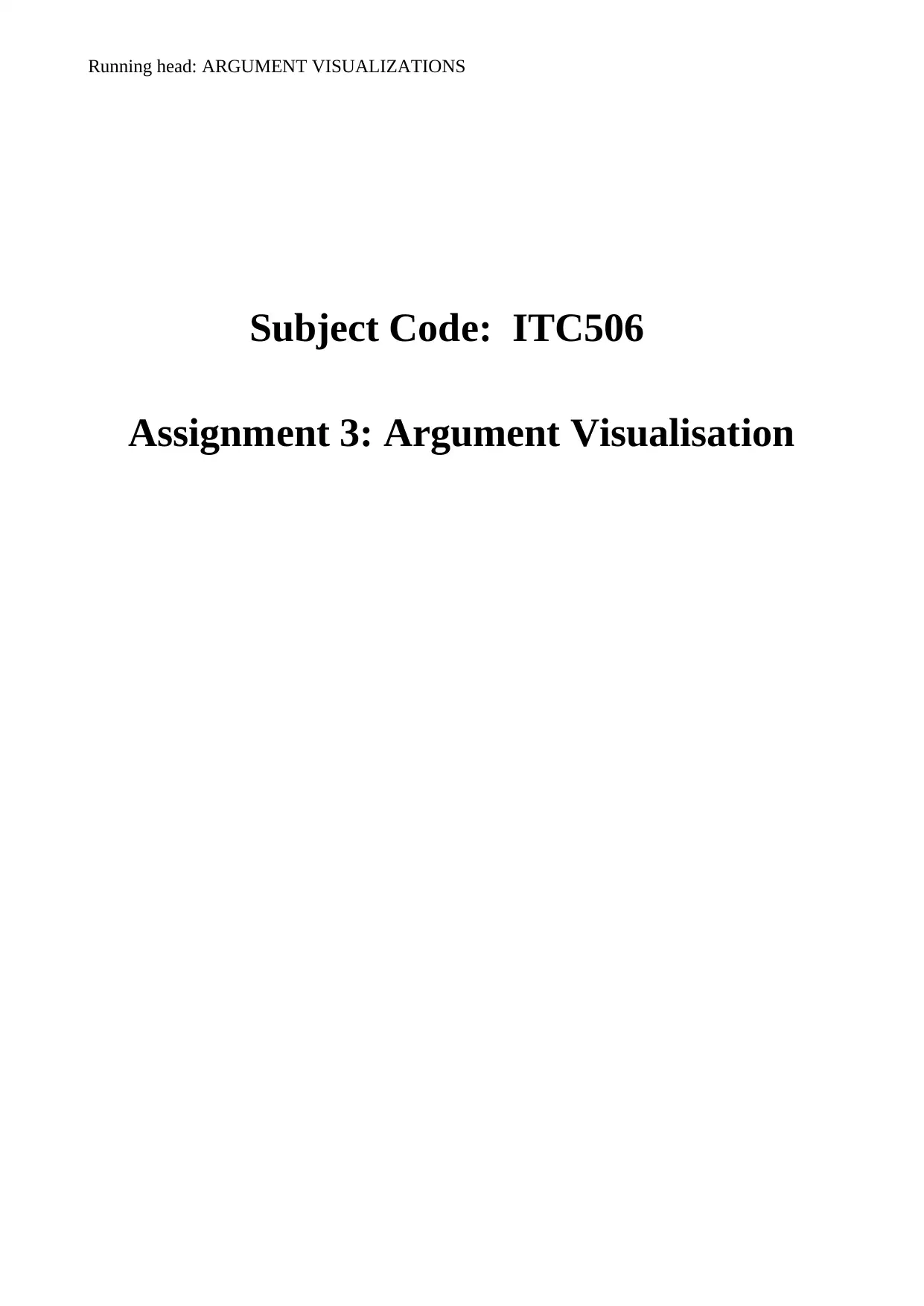
Running head: ARGUMENT VISUALIZATIONS
Subject Code: ITC506
Assignment 3: Argument Visualisation
Subject Code: ITC506
Assignment 3: Argument Visualisation
Paraphrase This Document
Need a fresh take? Get an instant paraphrase of this document with our AI Paraphraser
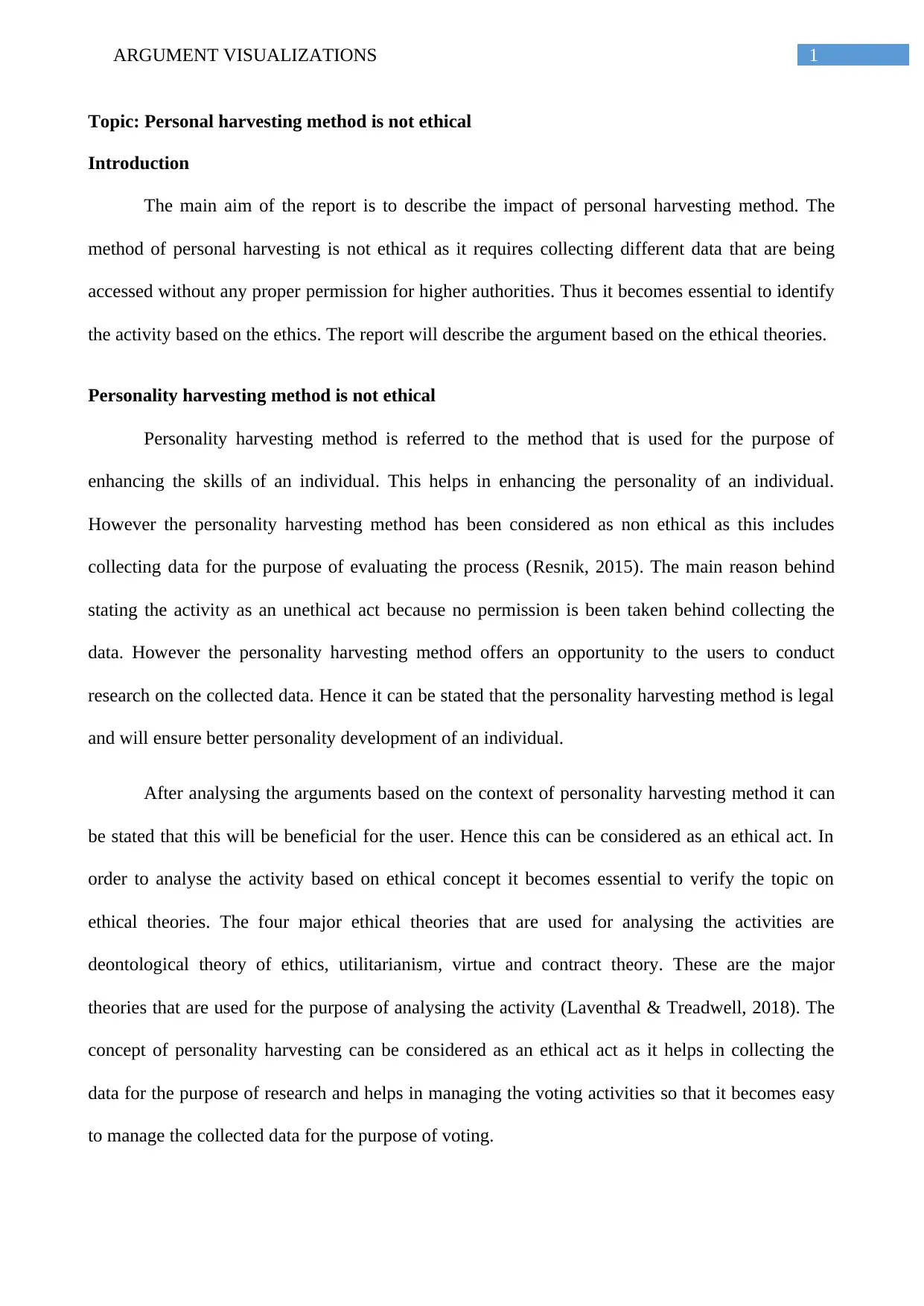
1ARGUMENT VISUALIZATIONS
Topic: Personal harvesting method is not ethical
Introduction
The main aim of the report is to describe the impact of personal harvesting method. The
method of personal harvesting is not ethical as it requires collecting different data that are being
accessed without any proper permission for higher authorities. Thus it becomes essential to identify
the activity based on the ethics. The report will describe the argument based on the ethical theories.
Personality harvesting method is not ethical
Personality harvesting method is referred to the method that is used for the purpose of
enhancing the skills of an individual. This helps in enhancing the personality of an individual.
However the personality harvesting method has been considered as non ethical as this includes
collecting data for the purpose of evaluating the process (Resnik, 2015). The main reason behind
stating the activity as an unethical act because no permission is been taken behind collecting the
data. However the personality harvesting method offers an opportunity to the users to conduct
research on the collected data. Hence it can be stated that the personality harvesting method is legal
and will ensure better personality development of an individual.
After analysing the arguments based on the context of personality harvesting method it can
be stated that this will be beneficial for the user. Hence this can be considered as an ethical act. In
order to analyse the activity based on ethical concept it becomes essential to verify the topic on
ethical theories. The four major ethical theories that are used for analysing the activities are
deontological theory of ethics, utilitarianism, virtue and contract theory. These are the major
theories that are used for the purpose of analysing the activity (Laventhal & Treadwell, 2018). The
concept of personality harvesting can be considered as an ethical act as it helps in collecting the
data for the purpose of research and helps in managing the voting activities so that it becomes easy
to manage the collected data for the purpose of voting.
Topic: Personal harvesting method is not ethical
Introduction
The main aim of the report is to describe the impact of personal harvesting method. The
method of personal harvesting is not ethical as it requires collecting different data that are being
accessed without any proper permission for higher authorities. Thus it becomes essential to identify
the activity based on the ethics. The report will describe the argument based on the ethical theories.
Personality harvesting method is not ethical
Personality harvesting method is referred to the method that is used for the purpose of
enhancing the skills of an individual. This helps in enhancing the personality of an individual.
However the personality harvesting method has been considered as non ethical as this includes
collecting data for the purpose of evaluating the process (Resnik, 2015). The main reason behind
stating the activity as an unethical act because no permission is been taken behind collecting the
data. However the personality harvesting method offers an opportunity to the users to conduct
research on the collected data. Hence it can be stated that the personality harvesting method is legal
and will ensure better personality development of an individual.
After analysing the arguments based on the context of personality harvesting method it can
be stated that this will be beneficial for the user. Hence this can be considered as an ethical act. In
order to analyse the activity based on ethical concept it becomes essential to verify the topic on
ethical theories. The four major ethical theories that are used for analysing the activities are
deontological theory of ethics, utilitarianism, virtue and contract theory. These are the major
theories that are used for the purpose of analysing the activity (Laventhal & Treadwell, 2018). The
concept of personality harvesting can be considered as an ethical act as it helps in collecting the
data for the purpose of research and helps in managing the voting activities so that it becomes easy
to manage the collected data for the purpose of voting.
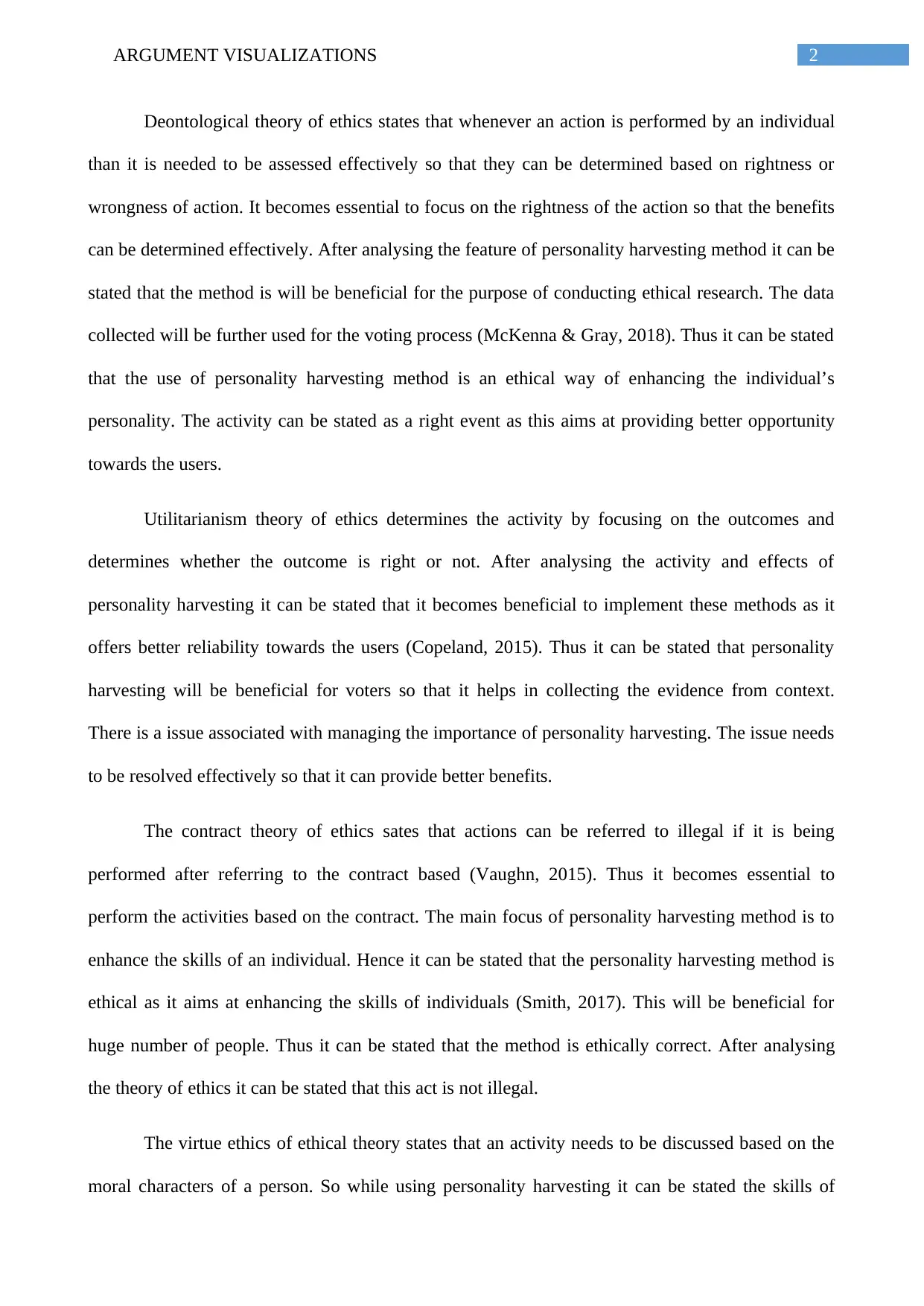
2ARGUMENT VISUALIZATIONS
Deontological theory of ethics states that whenever an action is performed by an individual
than it is needed to be assessed effectively so that they can be determined based on rightness or
wrongness of action. It becomes essential to focus on the rightness of the action so that the benefits
can be determined effectively. After analysing the feature of personality harvesting method it can be
stated that the method is will be beneficial for the purpose of conducting ethical research. The data
collected will be further used for the voting process (McKenna & Gray, 2018). Thus it can be stated
that the use of personality harvesting method is an ethical way of enhancing the individual’s
personality. The activity can be stated as a right event as this aims at providing better opportunity
towards the users.
Utilitarianism theory of ethics determines the activity by focusing on the outcomes and
determines whether the outcome is right or not. After analysing the activity and effects of
personality harvesting it can be stated that it becomes beneficial to implement these methods as it
offers better reliability towards the users (Copeland, 2015). Thus it can be stated that personality
harvesting will be beneficial for voters so that it helps in collecting the evidence from context.
There is a issue associated with managing the importance of personality harvesting. The issue needs
to be resolved effectively so that it can provide better benefits.
The contract theory of ethics sates that actions can be referred to illegal if it is being
performed after referring to the contract based (Vaughn, 2015). Thus it becomes essential to
perform the activities based on the contract. The main focus of personality harvesting method is to
enhance the skills of an individual. Hence it can be stated that the personality harvesting method is
ethical as it aims at enhancing the skills of individuals (Smith, 2017). This will be beneficial for
huge number of people. Thus it can be stated that the method is ethically correct. After analysing
the theory of ethics it can be stated that this act is not illegal.
The virtue ethics of ethical theory states that an activity needs to be discussed based on the
moral characters of a person. So while using personality harvesting it can be stated the skills of
Deontological theory of ethics states that whenever an action is performed by an individual
than it is needed to be assessed effectively so that they can be determined based on rightness or
wrongness of action. It becomes essential to focus on the rightness of the action so that the benefits
can be determined effectively. After analysing the feature of personality harvesting method it can be
stated that the method is will be beneficial for the purpose of conducting ethical research. The data
collected will be further used for the voting process (McKenna & Gray, 2018). Thus it can be stated
that the use of personality harvesting method is an ethical way of enhancing the individual’s
personality. The activity can be stated as a right event as this aims at providing better opportunity
towards the users.
Utilitarianism theory of ethics determines the activity by focusing on the outcomes and
determines whether the outcome is right or not. After analysing the activity and effects of
personality harvesting it can be stated that it becomes beneficial to implement these methods as it
offers better reliability towards the users (Copeland, 2015). Thus it can be stated that personality
harvesting will be beneficial for voters so that it helps in collecting the evidence from context.
There is a issue associated with managing the importance of personality harvesting. The issue needs
to be resolved effectively so that it can provide better benefits.
The contract theory of ethics sates that actions can be referred to illegal if it is being
performed after referring to the contract based (Vaughn, 2015). Thus it becomes essential to
perform the activities based on the contract. The main focus of personality harvesting method is to
enhance the skills of an individual. Hence it can be stated that the personality harvesting method is
ethical as it aims at enhancing the skills of individuals (Smith, 2017). This will be beneficial for
huge number of people. Thus it can be stated that the method is ethically correct. After analysing
the theory of ethics it can be stated that this act is not illegal.
The virtue ethics of ethical theory states that an activity needs to be discussed based on the
moral characters of a person. So while using personality harvesting it can be stated the skills of
⊘ This is a preview!⊘
Do you want full access?
Subscribe today to unlock all pages.

Trusted by 1+ million students worldwide
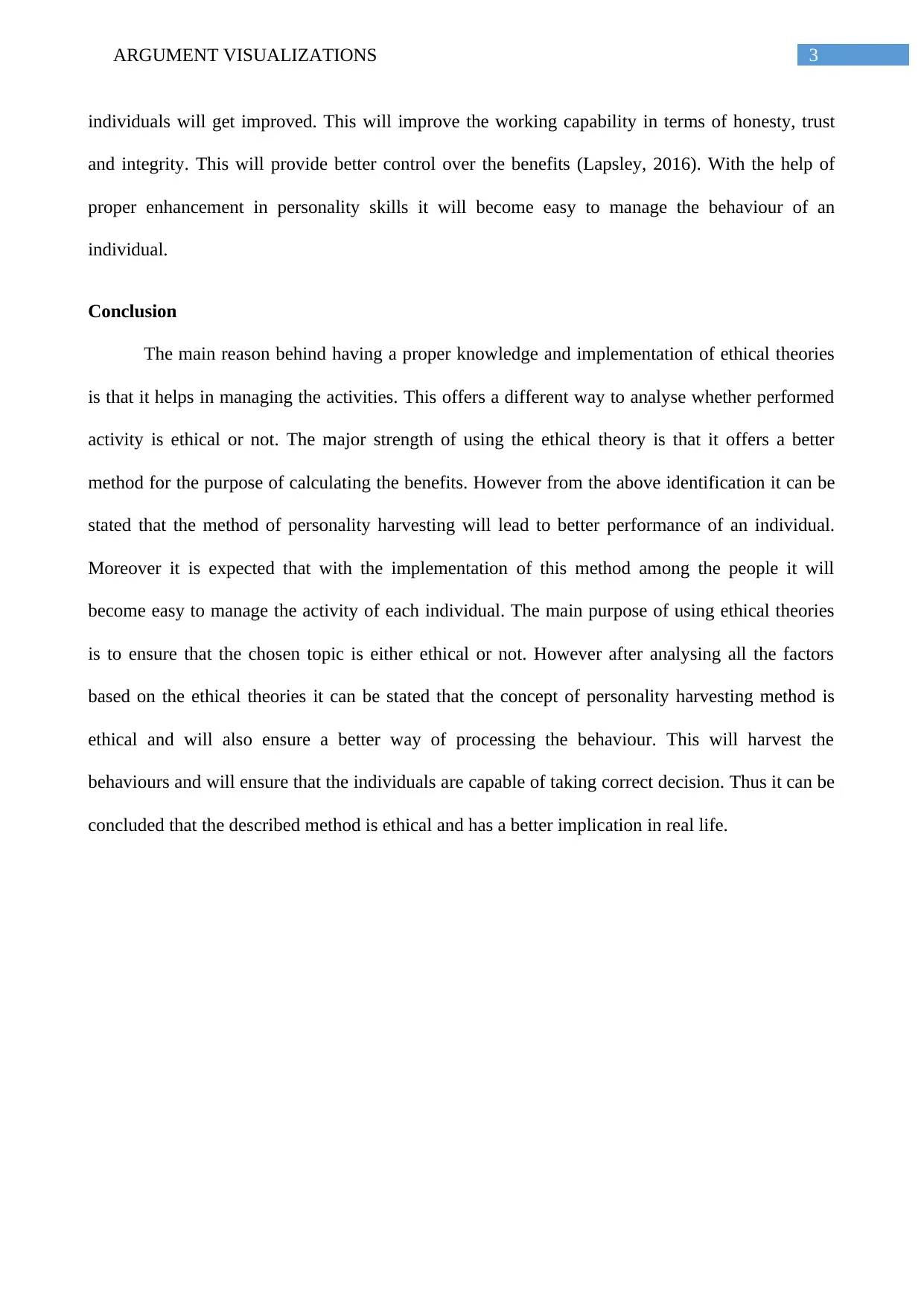
3ARGUMENT VISUALIZATIONS
individuals will get improved. This will improve the working capability in terms of honesty, trust
and integrity. This will provide better control over the benefits (Lapsley, 2016). With the help of
proper enhancement in personality skills it will become easy to manage the behaviour of an
individual.
Conclusion
The main reason behind having a proper knowledge and implementation of ethical theories
is that it helps in managing the activities. This offers a different way to analyse whether performed
activity is ethical or not. The major strength of using the ethical theory is that it offers a better
method for the purpose of calculating the benefits. However from the above identification it can be
stated that the method of personality harvesting will lead to better performance of an individual.
Moreover it is expected that with the implementation of this method among the people it will
become easy to manage the activity of each individual. The main purpose of using ethical theories
is to ensure that the chosen topic is either ethical or not. However after analysing all the factors
based on the ethical theories it can be stated that the concept of personality harvesting method is
ethical and will also ensure a better way of processing the behaviour. This will harvest the
behaviours and will ensure that the individuals are capable of taking correct decision. Thus it can be
concluded that the described method is ethical and has a better implication in real life.
individuals will get improved. This will improve the working capability in terms of honesty, trust
and integrity. This will provide better control over the benefits (Lapsley, 2016). With the help of
proper enhancement in personality skills it will become easy to manage the behaviour of an
individual.
Conclusion
The main reason behind having a proper knowledge and implementation of ethical theories
is that it helps in managing the activities. This offers a different way to analyse whether performed
activity is ethical or not. The major strength of using the ethical theory is that it offers a better
method for the purpose of calculating the benefits. However from the above identification it can be
stated that the method of personality harvesting will lead to better performance of an individual.
Moreover it is expected that with the implementation of this method among the people it will
become easy to manage the activity of each individual. The main purpose of using ethical theories
is to ensure that the chosen topic is either ethical or not. However after analysing all the factors
based on the ethical theories it can be stated that the concept of personality harvesting method is
ethical and will also ensure a better way of processing the behaviour. This will harvest the
behaviours and will ensure that the individuals are capable of taking correct decision. Thus it can be
concluded that the described method is ethical and has a better implication in real life.
Paraphrase This Document
Need a fresh take? Get an instant paraphrase of this document with our AI Paraphraser
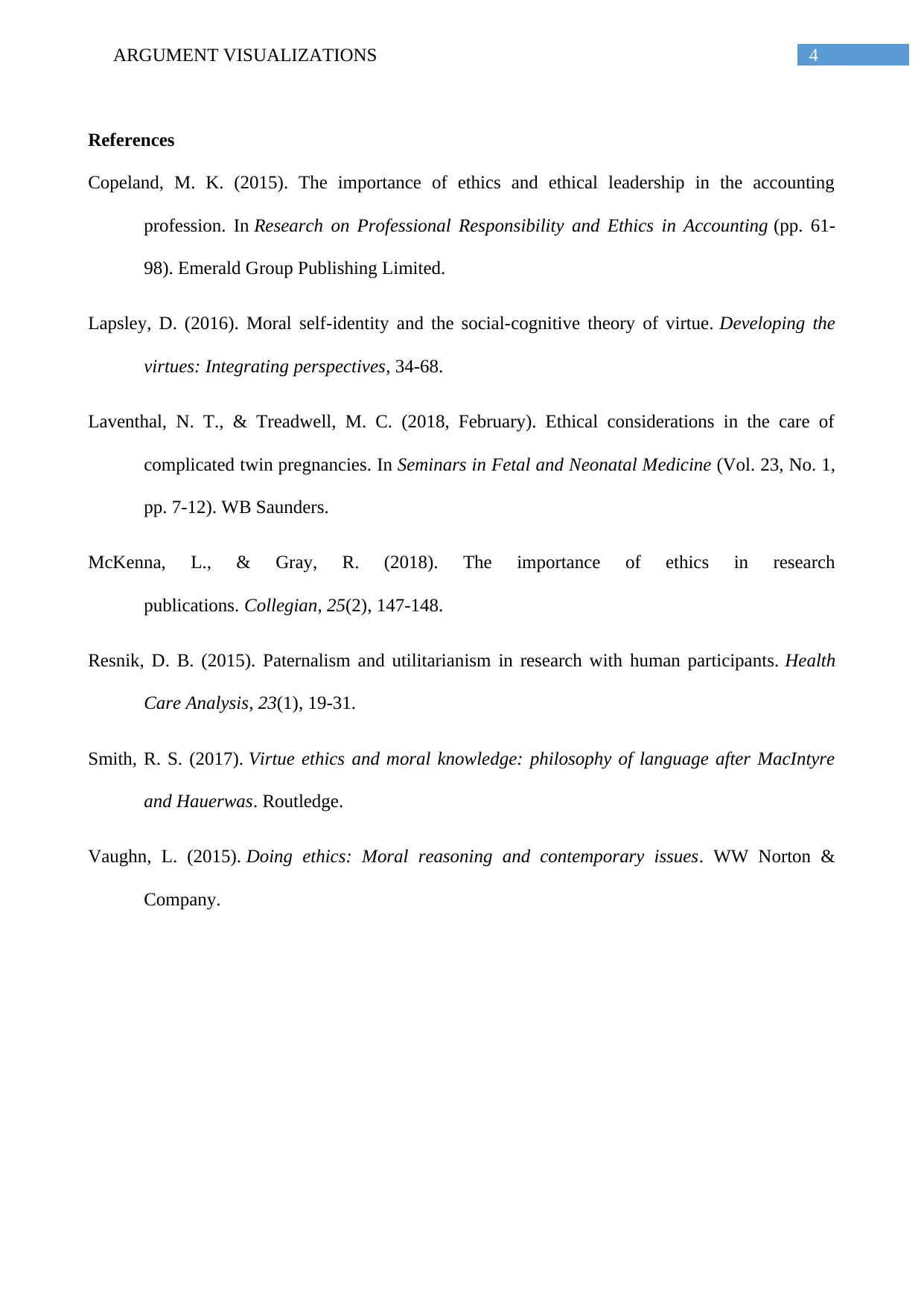
4ARGUMENT VISUALIZATIONS
References
Copeland, M. K. (2015). The importance of ethics and ethical leadership in the accounting
profession. In Research on Professional Responsibility and Ethics in Accounting (pp. 61-
98). Emerald Group Publishing Limited.
Lapsley, D. (2016). Moral self-identity and the social-cognitive theory of virtue. Developing the
virtues: Integrating perspectives, 34-68.
Laventhal, N. T., & Treadwell, M. C. (2018, February). Ethical considerations in the care of
complicated twin pregnancies. In Seminars in Fetal and Neonatal Medicine (Vol. 23, No. 1,
pp. 7-12). WB Saunders.
McKenna, L., & Gray, R. (2018). The importance of ethics in research
publications. Collegian, 25(2), 147-148.
Resnik, D. B. (2015). Paternalism and utilitarianism in research with human participants. Health
Care Analysis, 23(1), 19-31.
Smith, R. S. (2017). Virtue ethics and moral knowledge: philosophy of language after MacIntyre
and Hauerwas. Routledge.
Vaughn, L. (2015). Doing ethics: Moral reasoning and contemporary issues. WW Norton &
Company.
References
Copeland, M. K. (2015). The importance of ethics and ethical leadership in the accounting
profession. In Research on Professional Responsibility and Ethics in Accounting (pp. 61-
98). Emerald Group Publishing Limited.
Lapsley, D. (2016). Moral self-identity and the social-cognitive theory of virtue. Developing the
virtues: Integrating perspectives, 34-68.
Laventhal, N. T., & Treadwell, M. C. (2018, February). Ethical considerations in the care of
complicated twin pregnancies. In Seminars in Fetal and Neonatal Medicine (Vol. 23, No. 1,
pp. 7-12). WB Saunders.
McKenna, L., & Gray, R. (2018). The importance of ethics in research
publications. Collegian, 25(2), 147-148.
Resnik, D. B. (2015). Paternalism and utilitarianism in research with human participants. Health
Care Analysis, 23(1), 19-31.
Smith, R. S. (2017). Virtue ethics and moral knowledge: philosophy of language after MacIntyre
and Hauerwas. Routledge.
Vaughn, L. (2015). Doing ethics: Moral reasoning and contemporary issues. WW Norton &
Company.
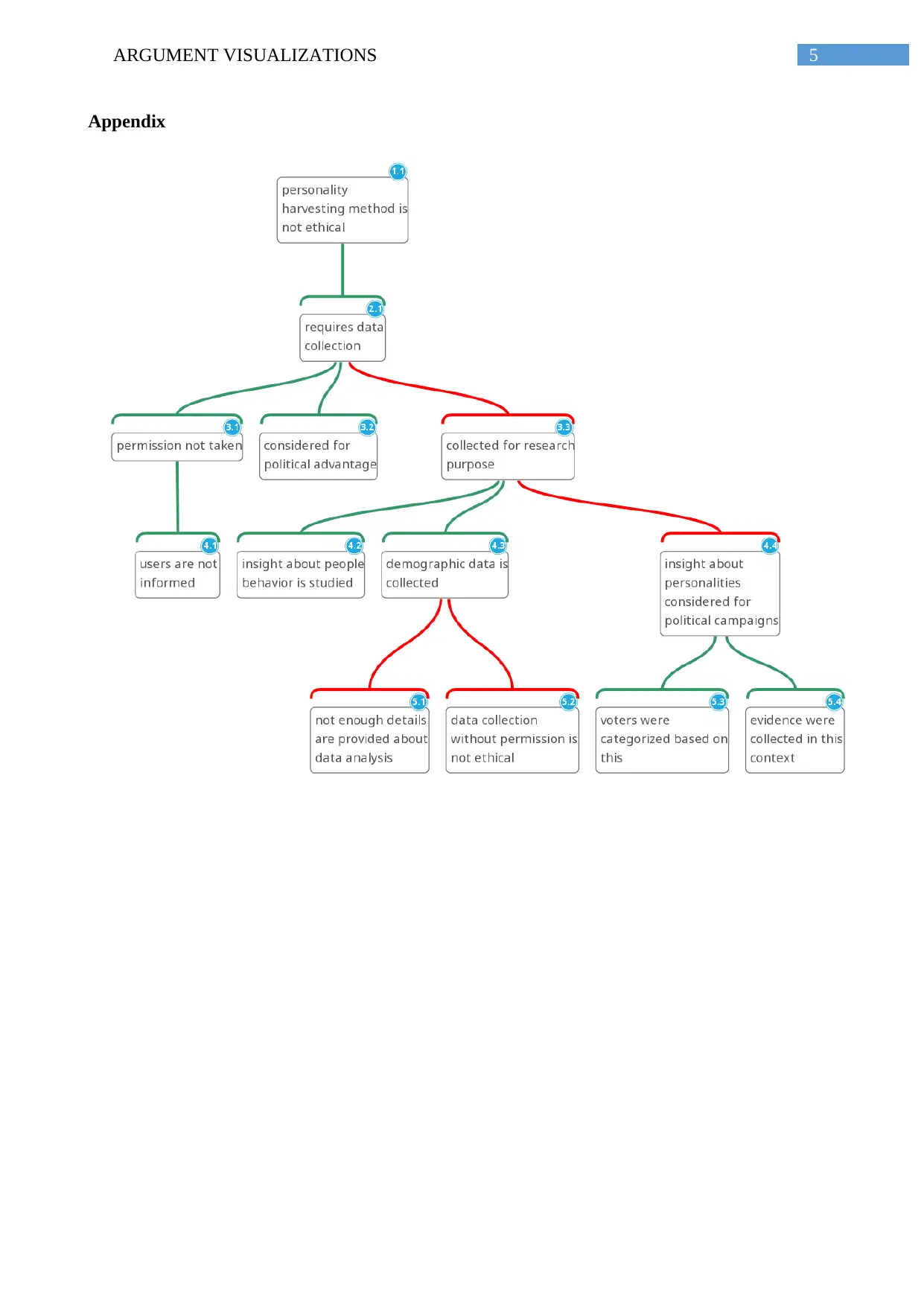
5ARGUMENT VISUALIZATIONS
Appendix
Appendix
⊘ This is a preview!⊘
Do you want full access?
Subscribe today to unlock all pages.

Trusted by 1+ million students worldwide
1 out of 6
Related Documents
Your All-in-One AI-Powered Toolkit for Academic Success.
+13062052269
info@desklib.com
Available 24*7 on WhatsApp / Email
![[object Object]](/_next/static/media/star-bottom.7253800d.svg)
Unlock your academic potential
Copyright © 2020–2025 A2Z Services. All Rights Reserved. Developed and managed by ZUCOL.





